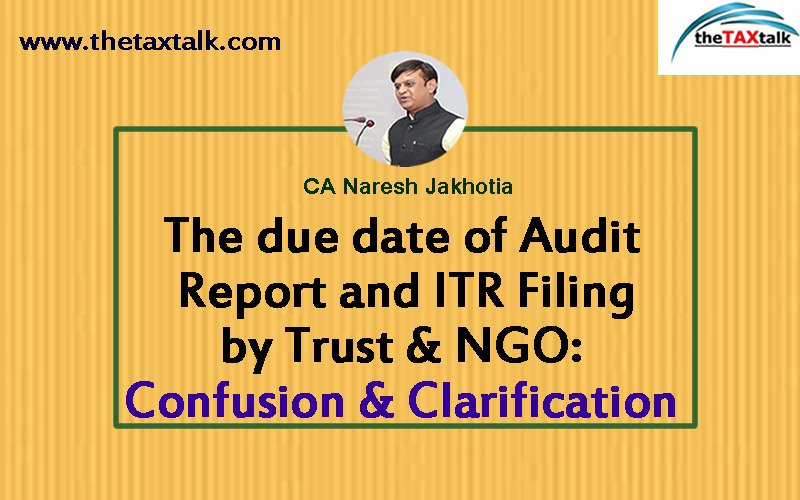![]()
The due date of Audit Report and ITR Filing by Trust & NGO: Confusion & Clarification
Query]
-
Ours is an NGO registered with FCRA. The last date of submission was 31st Dec 2021. Your have mentioned in you article that the Audit report may be uploaded before 15th Jan 2022 accessible at- https://thetaxtalk.com/2022/01/11/finally-tax-audit/
-
We are yet to upload. We should be doing it in a couple of days. Please guide regarding the extended date of 15th Jan 2022. Kindly forward the notification regarding extension of filing audited report of FCRA registered NGO, extended upto 15th Jan 2022? [SP]
Opinion:
Thanks for the issue and query. I believe there are many taxpayers who are equally engrossed with this issue. Let me try to simplify the issue in the easiest possible way. Please let me know if any doubt or confusion remains.
-
The due date is governed by section 139(1) of the Income Tax Act – 1961 which provides a due date for various classes of the taxpayers.
-
Section 139 is a complete code in itself and it provides the persons who are required to file the return, categories of persons who are required to file, different situations in which the return may be required even without income, due date within which the return should be filed by the taxpayers, etc.
-
Section 139 read with section 119 further empowers the CBDT to further relax the due date if the circumstances or situation so demands.
-
The explanation 2 in section 139 provides for the due date of filing income tax returns for different categories of the taxpayers as under:
Explanation 2.—In this sub-section, “due date” means,—
(a) where the assessee other than an assessee referred to in clause (aa) is—
(i) a company; or
(ii) a person (other than a company) whose accounts are required to be audited under this Act or under any other law for the time being in force; or
(iii) a partner of a firm whose accounts are required to be audited under this Act or under any other law for the time being in force or the spouse of such partner if the provisions of section 5A applies to such spouse],
the 1st day of October] of the assessment year;
-
It may be noted that the due date is 31st October for certain categories of person specified therein.
-
In clause (ii), it includes “a person (other than a company) whose accounts are required to be audited under this Act or under any other law for the time being in force;”
-
One may note that the trusts are required to get the books of accounts audited under the relevant Act also wherein it is registered. Normally, trusts are registered either under the Society Act, Companies Act, Trust Act etc. All such Act throughout the country stipulates to get the books of accounts of trust audited as a mandatory condition.
Further, the Income Tax Act also provides for the audit of the trust if the income (i.e., gross receipts in general ) of such trust exceeds the amount which is not chargeable to tax (i.e., Rs. 2.50 Lakh for most of the trust as this is the basic exemption limit which is applicable to individual assessee).
In short, the trusts are required to get the books of accounts audited under the Respective Act of their registration as well as under the Income Tax Law. Even if the audit is required in any o f the Act, it would fall in the clause (ii) to Explanation 2 reproduced above.
The above discussion is just to highlight that the due date for trust is 31st October and not 31st July as applicable to other categories of the taxpayers.
-
The due date of filing the income tax return is often relaxed / extended by the CBDT to take care of special situations & problems in filing the income tax return. This date of 31st October for the FY 2020-21 was extended to 15th February 2022 by the CBDT vide Circular No.9/2021 dated 20.05.2021 and Circular No.17/2021 dated 09.09.2021. This date is further extended to 15th March 2022 now by Circular NO. 1/2022 dated 11.02.2021.
-
It may be noted that the due date of filing income tax return by the trust is 15th March 2022 now for FY 2020-21. You may refer
https://thetaxtalk.com/2022/01/11/finally-tax-audit/
-
As far as the audit of the trust is concerned, the due date for filing the audit report is specified as one month prior to the due date of filing the income tax return.
In short, the due date of filing the audit report by the trust shall be 15th February 2022 now for the FY 2020-21.
-
It may be noted that there is no special or separate due date for FCRA registered NGO. The date applicable to normal trust would be applicable even to the FCRA registered NGO. The Act itself contains the provision of the due date and as such no separate notification / circular is required except in respect of date extension which is referred to and discussed hereinabove.
-
Section 139 of the Income Tax Act-1961 is reproduced hereunder for ease of reference and access
For ease of reference, Section 139(1) is reproduced hereunder for easy access and understanding:
Return of income.
-
(1) Every person,—

